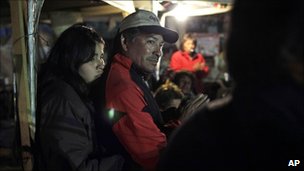 An attempt to rescue 33 miners trapped underground in Chile will begin at midnight on Tuesday (0300 GMT), Mining Minister Laurence Golborne has said.
An attempt to rescue 33 miners trapped underground in Chile will begin at midnight on Tuesday (0300 GMT), Mining Minister Laurence Golborne has said.
A test of the steel rescue capsule was earlier carried out successfully, descending almost the whole way down a 622m (2,040ft) shaft, engineers said.
The men were trapped in the San Jose mine by a tunnel collapse on 5 August.
Correspondents say there is a sense of excitement on the surface, with the miners' families counting the hours.
Journalists have flocked to the mine from all over the world to see the freed men emerge from their two-month ordeal.
Wives and girlfriends, who are camped out at the site entrance, have been planning the outfits they want to wear to greet their menfolk.
President Sebastian Pinera is due to arrive at the mine later on Tuesday and security has been tightened. Police on horseback are patrolling the hillsides surrounding the remote desert site.
The drill that reached the miners on Saturday left the site to a rousing reception on Monday. The "Plan B" drill was driven away surrounded by crowds of photographers and cheered by hundreds of people across the site.
Shortly afterwards, officials briefed the media on the latest developments in the bid to bring the miners to the surface.
Chief engineer Andre Sougarret said a formal test of the shaft had been successful, with the specially constructed, 53cm (21in) Phoenix rescue capsule barely registering a scratch as it travelled up and down the tunnel.
But he warned: "There's always a risk transporting people in a vertical system."
Earlier, the top of the shaft was reinforced with metal casing to prevent crumbling surface rocks from breaking away during the rescue. Experts said the rest of the escape shaft was dug through solid rock and would not break up.
Speaking to some of the estimated 1,000 journalists now at the mine, Mr Golborne said the operation would not be rushed.
"We are going to take all the time necessary to ensure the completion of these plans," he said.
Sixteen highly-trained rescuers - members of the Chilean special forces and veterans of previous underground rescues - are poised and on call to begin the process of bringing out the miners.
But the rescuers would only be told at the last minute which of them would lead off the rescue attempt, Mr Golborne told reporters.
"All the rescuers have been prepared to fulfil that role," he said, adding that the person "best suited" to the task would go first.
'Comradeship'
The miners have already been informed about which of them will be the first out of the mine, Chilean media has reported.
They have not been named but are thought to include some of the most psychologically stable and experienced of the miners - in case something goes wrong during the first few rescues.
Next will be those who are weakest or ill. One miner suffers from hypertension. Another is a diabetic, and others have dental and respiratory infections or skin lesions caused by the humidity in the mine.
The capsule is expected to travel the 622m to the surface in about 15 minutes. If they encounter problems, they can detach the cage from the top of the capsule and lower themselves back down.
Each miner will wear a "bio-harness" designed for astronauts, which will monitor their heart rate, breathing, temperature and oxygen consumption.
After their rescue, the miners will be taken to a triage station. When they have been cleared by doctors there, they will be reunited with their families. Later, they will be flown to a hospital in the nearby city of Copiapo.
Meanwhile, Alejandro Pino, a journalist who has been in daily contact with the miners and advising them on handling interviews, revealed that he had been helping them prepare a speech.
"I asked them to give me just one word and with that word I would show them how to create a speech," he said.
"It was just a try, so I can repeat to you what happened because I was touched by it and they were touched by it too, not because I made the speech but because the word they chose to start with was extraordinary: it was 'comradeship'."
For the families who have mounted a vigil since their loved ones were trapped more than two months ago, the final hours are upon them.
"I'm so tired. It's been far too many days doing nothing, just sitting waiting," Alicia Campos, mother of Daniel Herrera told the Reuters news agency.



